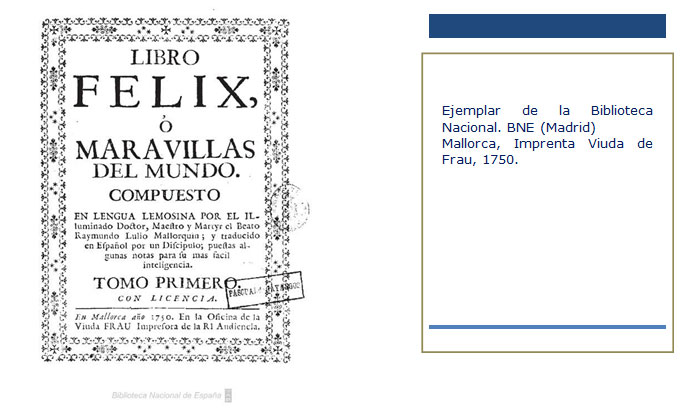
Presentation of the book Félix o Libro de Maravillas (Felix or The Book of Wonders) by Ramón Llull at the Faculty of Education, UNED in a new volume of the Collectio scriptorum et renascentium series on 29 June 2016, with the participation of Julia Butiña and Fernando Domínguez Reboiras.
Dr. Butiña is a professor of medieval Catalan literature (UNED 2009) and head of the Research Group on Ramón Llull (Félix: 2007-2012). Dr Domínguez Reboiras, whose main work is the critical review of the Latin work of Ramón Llull, is a member and scientific collaborator of the Raimundus-Lullus Institute of the Albert-Ludswig University of Fribourg.
The protagonist of the Book of Wonders is a young man, Felix, whose father sends him out into the world to wonder and marvel at the evil around him. During his journey Felix observes and analyzes the universe in ten books or sections: (1) God, (2) angels, (3) the heavens, (4) the elements, (5) plants, (6) metals, (7) animals, (8) man, (9) paradise and/or hell(10). An order of things that represents the idea of the world as a divine creation.
Descriptions of objects and narration of incidents are mixed with examples, stories and episodes in the form of dialogue with some philosophers who resolve all Felix's doubts and misgivings through reason, enigmas and parables. His pilgrimnage reveals the enormous contrast between the perfect and beautiful world in which God placed man and how man commits evil and destroys the world. While creation is orderly and perfect, man, having free will, does what he should not do and turns everything upside down, thus destroying this perfect order.
The Book of Wonders is therefore an exhortation to correct human endeavor against the backdrop of a perfect and orderly divine creation. Man should behave like the other creatures, but only man – oh wonder! – is capable of acting against this order. Understanding that man can and has to freely follow the natural order God desires is the basis of all human moral that Llull tries to transmit in this beautiful scenario.